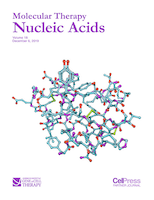
Molecular Therapy Nucleic Acids
Scope & Guideline
Advancing nucleic acid innovations for a healthier tomorrow.
Introduction
Aims and Scopes
- Gene Editing Technologies:
This area encompasses advancements in CRISPR, TALENs, and other gene editing techniques aimed at correcting genetic disorders, improving genomic stability, and developing novel therapeutic strategies. - Nucleic Acid Delivery Systems:
Research in this scope focuses on the development of novel carriers and delivery mechanisms, such as lipid nanoparticles, exosomes, and viral vectors, to enhance the cellular uptake and efficacy of nucleic acid therapeutics. - RNA Therapeutics:
The journal emphasizes the therapeutic potentials of various RNA molecules, including mRNA, siRNA, and circular RNAs, exploring their roles in gene regulation, disease treatment, and potential applications in cancer and genetic disorders. - Mechanisms of Action and Safety:
Research that investigates the mechanisms through which nucleic acid therapies exert their effects and the safety profiles of these treatments, including off-target effects and immune responses. - Translational Research:
The journal also focuses on the translation of basic research findings into clinical applications, emphasizing studies that bridge laboratory discoveries with patient care.
Trending and Emerging
- Enhanced CRISPR-Cas9 Techniques:
Recent publications highlight advancements in CRISPR-Cas9 technology, including improved specificity and efficiency, as well as novel applications in gene therapy for complex diseases. - RNA Modifications and Their Therapeutic Implications:
There is an increasing focus on understanding how RNA modifications, such as m6A, influence the stability and function of therapeutic RNAs, opening new avenues for enhancing RNA-based therapies. - Circular RNAs as Therapeutics:
Research into the therapeutic potential of circular RNAs is gaining momentum, exploring their roles in disease mechanisms and their utility as novel therapeutic agents. - AI and Machine Learning in RNA Research:
The integration of artificial intelligence and machine learning techniques in the design and optimization of RNA therapeutics is emerging as a significant trend, showcasing the potential for computational approaches to enhance nucleic acid therapy development. - Exosome-Mediated Delivery Systems:
Publications are increasingly focusing on exosomes as natural carriers for delivering RNA therapeutics, capitalizing on their biocompatibility and ability to evade immune detection.
Declining or Waning
- Traditional Gene Therapy Approaches:
There is a noticeable decline in research focused on older gene therapy methods that do not utilize contemporary techniques such as CRISPR or innovative delivery systems. This shift reflects the field's movement towards more advanced technologies. - Basic Mechanistic Studies of RNA Interference:
Studies that focus solely on the fundamental aspects of RNA interference without translational applications are becoming less common, as the field increasingly prioritizes applied research with direct therapeutic implications. - In Vivo Models in Preclinical Studies:
Research utilizing traditional animal models for initial testing of nucleic acid therapies may be waning, as there is a growing trend towards more sophisticated models, such as organoids or humanized systems, that better mimic human pathophysiology.
Similar Journals

EMBO REPORTS
Connecting Researchers with Groundbreaking DiscoveriesEMBO REPORTS, published by WILEY, is a premier journal in the fields of Biochemistry, Genetics, and Molecular Biology, recognized for its rigorous peer-review process and impactful scientific contributions. Established in the year 2000 in the United Kingdom, this journal has maintained a stellar reputation, reflected in its consistent positioning within the Q1 category across these disciplines as of 2023. EMBO REPORTS excels in disseminating high-quality and timely research that addresses fundamental questions and challenges in molecular biology and genetics, making it an invaluable resource for researchers, professionals, and students. With impressive Scopus rankings, including Genetics at the 32nd rank and a 90th percentile placement, it fosters an environment for scholarly exchange and advances in knowledge. While Open Access options are not available, the journal continues to enhance its impact through traditional subscription models, thereby maintaining wide visibility in the scientific community. Its ongoing evolution promises continued relevance and influence until at least 2024.

Frontiers in Molecular Biosciences
Catalyzing Innovation in Molecular BiosciencesFrontiers in Molecular Biosciences is an esteemed open-access journal published by FRONTIERS MEDIA SA, based in Switzerland. Since its inception in 2014, the journal has made significant strides in the fields of biochemistry, genetics, and molecular biology, cementing its reputation with a solid position in the Q1 quartile for both Biochemistry and Genetics and Molecular Biology (miscellaneous) categories as of 2023. With a remarkable Scopus rank of #14/103 in the combined categories, it offers an essential platform for the dissemination of high-quality research that shapes the understanding of molecular processes and their implications in health and disease. The journal’s commitment to open access facilitates the broadest possible reach for groundbreaking discoveries, serving as a vital resource for researchers, professionals, and students alike. Located at AVENUE DU TRIBUNAL FEDERAL 34, LAUSANNE, this journal continues to foster innovative discussions and advancements in molecular biosciences, paving the way for new insights and collaborations in the scientific community.

Non-Coding RNA
Empowering Researchers with Open Access to RNA ScienceNon-Coding RNA is a prestigious open-access journal published by MDPI, based in Switzerland, dedicated to the significant and rapidly evolving field of non-coding RNA research. Established in 2015, this journal has quickly become an essential resource for researchers and professionals, showcasing innovative studies and breakthroughs related to the functions and mechanisms of non-coding RNAs in various biological processes. With an impressive Q1 ranking in Biochemistry and strong rankings in Genetics and Molecular Biology, Non-Coding RNA consistently reflects the highest standards of academic publishing. The journal provides comprehensive access options, granting researchers worldwide the ability to disseminate and access high-quality research without subscription barriers. As the landscape of genomics and molecular discoveries continues to expand, the journal aims to foster interdisciplinary exchanges and collaborations, making it a vital platform for advancing knowledge and innovation in this critical area of biological science.

JOURNAL OF OCULAR PHARMACOLOGY AND THERAPEUTICS
Charting new territories in ocular pharmacology and therapeutics.JOURNAL OF OCULAR PHARMACOLOGY AND THERAPEUTICS, published by Mary Ann Liebert, Inc, stands at the forefront of research in the realms of ophthalmology and pharmacology. Established in 1985 and converging until 2024, this esteemed journal is dedicated to advancing the understanding of ocular pharmacology, drug therapies, and therapeutic approaches in the treatment of eye diseases. With an impressive impact factor and categorized in the Q2 quartile for both Ophthalmology and Medical Pharmacology, it showcases pivotal research in the field, reflecting its rank of #31 among 137 in Ophthalmology and #109 among 272 in Medical Pharmacology per Scopus metrics. Although it follows a subscription-based model, the journal provides critical insights and empirical studies that foster innovation and collaboration for researchers, professionals, and students alike in the pursuit of improving ocular health.

BIOCHEMICAL AND BIOPHYSICAL RESEARCH COMMUNICATIONS
Fostering innovation in biochemical and biophysical research.BIOCHEMICAL AND BIOPHYSICAL RESEARCH COMMUNICATIONS, published by Academic Press Inc Elsevier Science, stands as a leading periodical in the fields of biochemistry, biophysics, cell biology, and molecular biology. With an ISSN of 0006-291X and an E-ISSN of 1090-2104, this esteemed journal has been a pivotal platform for the dissemination of groundbreaking research since its inception in 1959, continuing to publish influential findings through at least 2024. It holds a commendable Q2 ranking in Biochemistry and Q1 status in Biophysics as of 2023, reflecting its high impact and relevance in the field, supported by its strong Scopus rankings—ranking #43 in Biophysics and maintaining a presence in the top quartiles of several related categories. Although it is not an open-access journal, it provides critical insights and essential data that cater to researchers, professionals, and students keen on advancing their understanding of complex biochemical and biophysical processes. Its significant contributions to the scientific community underscore the importance of this journal as a reference point for innovative research and collaborative discourse.

Molecular Therapy Methods & Clinical Development
Pioneering clinical developments in cell therapy.Molecular Therapy Methods & Clinical Development, published by CELL PRESS, is a premier Open Access journal dedicated to advancing the field of gene and cell therapy through innovative methodologies and clinical developments. Since its inception in 2014, the journal has garnered significant attention within the research community, achieving impressive Q1 quartile rankings in Genetics, Molecular Biology, and Molecular Medicine as of 2023. With a commendable Scopus ranking that positions it within the top echelons of its categories, this journal serves as an essential platform for researchers, professionals, and students alike, providing access to cutting-edge research that drives the future of therapeutic approaches. With its commitment to Open Access, readers worldwide can easily access high-quality and impactful content that fosters collaboration and knowledge-sharing in this rapidly evolving domain. The journal’s scope encompasses crucial advancements in therapeutic methodologies, ensuring that it remains at the forefront of scientific discourse and innovation.

Molecular Cell
Advancing the Frontiers of Cell and Molecular Science.Molecular Cell, published by Cell Press, is a leading journal in the fields of cell biology and molecular biology. Established in 1997, this prestigious journal boasts a significant impact within the scientific community, evidenced by its impressive 2023 Scopus rankings, placing it in the top 2% of its field (Rank #10/410 in Molecular Biology, Rank #12/285 in Cell Biology). With a focus on cutting-edge research that bridges the gap between molecular genetics and cellular function, Molecular Cell serves as an essential platform for the dissemination of vital findings and innovative methodologies. Although it follows a traditional publishing model without Open Access options, its rigorous peer-review process and high standards ensure that articles published within these pages are of the utmost quality, making it an invaluable resource for researchers, professionals, and students alike seeking to stay at the forefront of scientific discovery. The journal's address is 50 Hampshire St, Floor 5, Cambridge, MA 02139, United States, reinforcing its commitment to fostering scientific excellence and collaboration.

CURRENT GENE THERAPY
Bridging Research and Clinical Practice.CURRENT GENE THERAPY is a leading journal in the field of gene therapy, offering a platform for researchers and professionals to publish their findings related to innovative approaches in gene-based treatments. Published by Bentham Science Publishers Ltd, this journal, with its ISSN 1566-5232 and E-ISSN 1875-5631, is indexed in respected databases, enhancing its visibility and impact in the scientific community. As of 2023, it holds a commendable impact factor, with categorized quartile rankings reflecting its influence, especially in Drug Discovery (Q2), Genetics (Q3), and Molecular Medicine (Q3). Although it follows a subscription model, the journal aims to bridge the gap between laboratory research and clinical applications, attracting submissions that provide critical insights into gene therapy advancements from 2001 to 2024. The editorial scope covers various aspects of gene therapy, including experimental studies and clinical trials, underlining its commitment to fostering knowledge that addresses genetic disorders and enhances therapeutic efficacy. Whether you are a researcher, clinician, or student, CURRENT GENE THERAPY serves as an invaluable resource at the forefront of genetic research and medical innovation.

CANCER GENE THERAPY
Driving Progress in Molecular Biology for Cancer SolutionsCancer Gene Therapy, published by SpringerNature, stands at the forefront of research in the fields of cancer research, molecular biology, and molecular medicine. With a robust impact factor reflecting its significant influence—ranking in the Q2 category for cancer research and Q1 for both molecular biology and molecular medicine—it serves as an essential resource for scholars and practitioners alike. Since its inception in 1994, the journal has dedicated itself to advancing the understanding and therapeutic application of genetic innovations in oncology. Notably, it holds distinguished Scopus ranks, placing it among the top tier journals in its categories, underscoring its importance to the scientific community. While open access options are not available, the compelling research published here offers invaluable insights into the latest advancements and strategies in cancer therapy. Engaging with *Cancer Gene Therapy* not only keeps professionals informed but also inspires future innovations in the quest for effective cancer treatments.

Biochemistry and Cell Biology
Connecting researchers through groundbreaking discoveries in life sciences.Biochemistry and Cell Biology, published by Canadian Science Publishing, is a prestigious journal that has been instrumental in advancing the fields of biochemistry, molecular biology, and cell biology since its inception in 1986. With an impressive scope spanning innovative research findings to comprehensive reviews, this journal serves as a vital resource for researchers, professionals, and students alike. Currently positioned in the Q2 quartile in Biochemistry and Q3 quartiles in both Cell Biology and Molecular Biology, it reflects a robust contribution to scientific discourse, placing it among reputable publications in its field. The journal boasts notable rankings within the Scopus database, highlighting its impact and relevance, and continues to be a valuable platform for disseminating pivotal research. By providing access to a wide array of articles, the journal remains committed to fostering knowledge and collaboration in the scientific community.